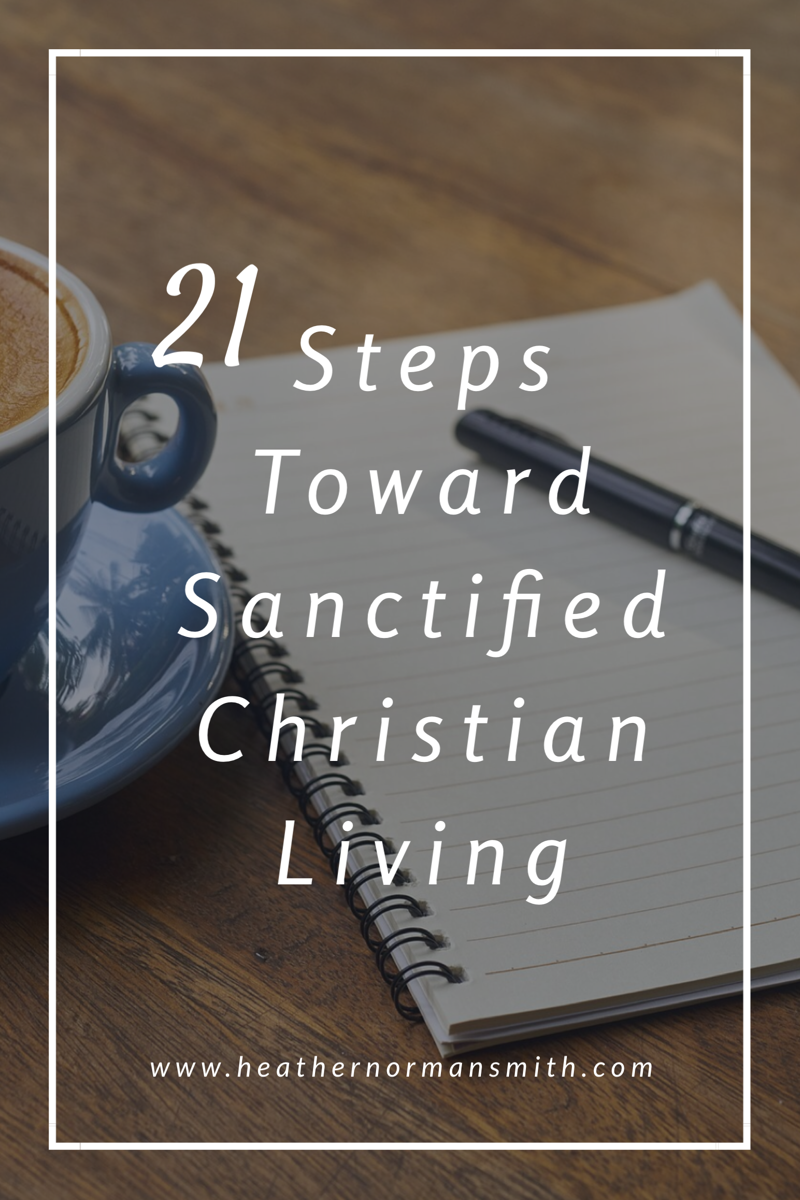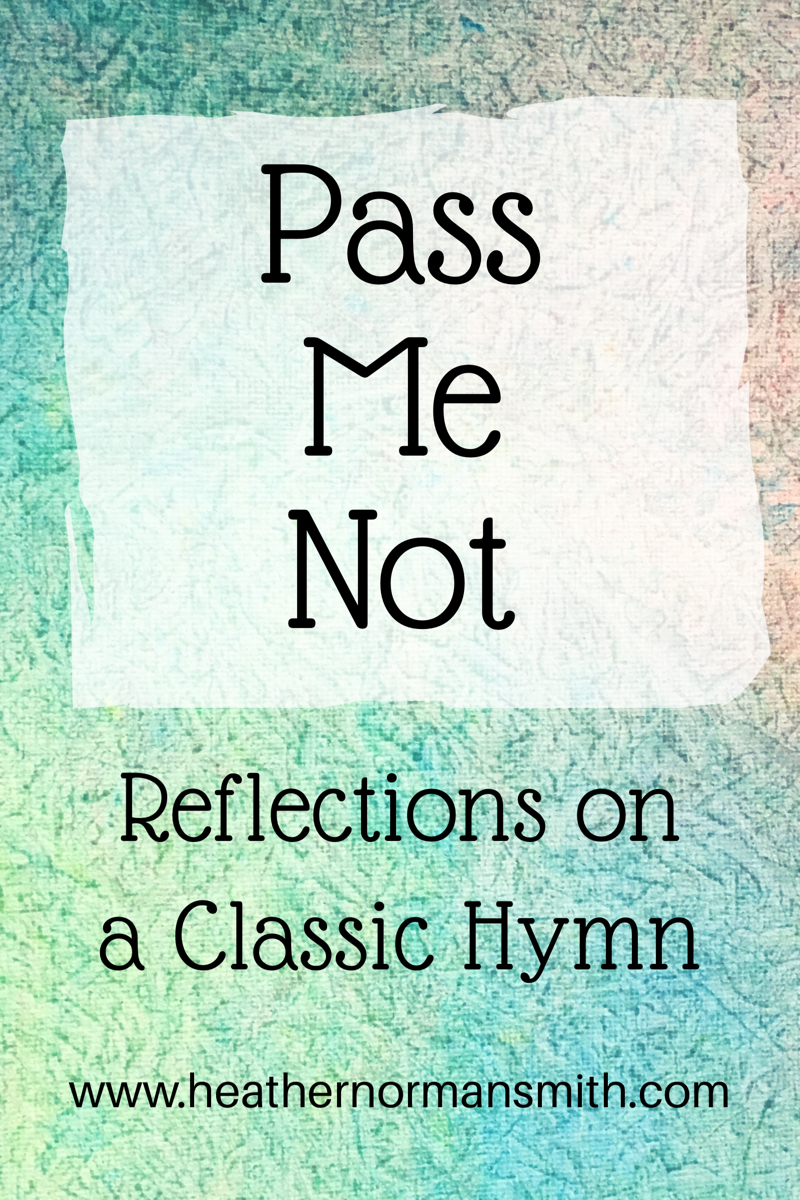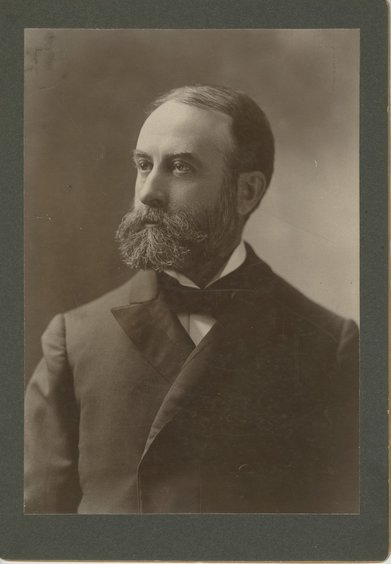|
Sometimes I get a thought about which I want to write, and I search the scriptures for help with that topic. Sometimes I search out the scriptures for help finding something to write about. This devotion was born of the latter method.
In my searching of the scriptures today, I “found” 1 Thessalonians, Chapters 4 and 5, and in these chapters, practical instruction for sanctified Christian living. I was struck by how plainly many of the exhortations are outlined. While we are only saved through faith in Christ, and not by our works, we are compelled by the Holy Spirit to strive to be more like Christ in our actions. The word “sanctified” means “set apart”, which is to say, markedly different from the non-believer in thought and practice. Please note, the title of this devotion is not "21 Steps to Sanctified Christian Living". I am not trying to present a comprehensive list here. I'm sure there are additional ways in which we should conduct ourselves to demonstrate sanctification. Please also note, this list is not my own invention! The ideas are taken directly from scripture, but I have paraphrased them in a list format. So, let's look at 1 Thessalonians. In Chapter 4, verse 3, it says: "For this is the will of God, your sanctification:" Well, that seems pretty clear! It could be interpreted that the idea of sanctification here pertains mainly to the exhortation immediately following (which is number one on the list below). But, I read that statement as an introduction to all the contents of Chapters 4 and 5, as the end of Chapter 5 seems to be a summary of the instructions in Paul's letter. 21 Steps Toward Sanctified Christian Living
Yes, this a list of "Dos" and "Dont's". But as with all biblical instruction, the purpose is not to restrict or burden, but is to improve the spiritual health of the believer. This list contains actions and practices that set us apart from those outside of the faith.
At the end of Chapter 5 we are left with some great encouragement! "Now may the God of peace himself sanctify you completely, and may your whole spirit and soul and body be kept blameless at the coming of our Lord Jesus Christ. He who calls you is faithful; he will surely do it." (5:23-24) Commit to serving Him and He will take care of the sanctification process.
I would love to hear your thoughts about this content! Please leave your comments below. If you found this devotion helpful, please consider sharing it on Facebook, Twitter, or Pinterest! If you would like to be notified of new blog posts via email, please subscribe!
1 Comment
I've always admired people who are "prayer warriors", but I have to admit, I've never felt like I fall into that category. Don't get me wrong- I enjoy talking to God, and prayer is certainly a daily practice for me, but I am so easily distracted that I often don't spend enough quality time in prayer. While my intention is not to absolve myself, I had a revelation recently that made me feel better about my prayer life, but most importantly, it filled me with awe about God's grace.
I often find myself whispering the words, "Your will be done, Lord"- when I'm driving, when I'm walking into my office, when I'm cleaning the house. My mind might be in a million different places, but those words will squeeze their way into my thoughts and I'll direct them to Him. It was while listening to a radio sermon about the Lord's Prayer a few days ago that God spoke to my spirit about this. I felt Him say that every time I had whispered those words, He had received them as a prayer and had acted on my behalf. He honored my five-word prayer. I suddenly felt like He has been ordering my steps, in part, because of my feeble little prayer for His will to be done. And then it made so much sense- little prayers are heard by a big God! I've known this for a long time, but it seemed God was making it a special point to remind me. Let's take a look at three "little" prayers in the bible that had great impact.
In all three of these examples, the petitions were granted, even though the words spoken were few. It didn't take great orations or lengthy invocations to move the heart of God. It seems when it comes to prayer, quality is more important than quantity, and what qualifies a prayer as effective is the faith behind it. To be sure, the more we can pray, with faith, the better! I know I should still strive daily to spend more time in prayer. There are so many things about which to pray- our families; our nation and leaders; our churches; our spiritual growth; non-believing loved ones. And those are just requests! We could spend 24/7 offering prayers of thanksgiving and praise! But, my point is that we shouldn't discount those quick prayers we utter throughout the day. 1 Thessalonians 5:17 says, "Pray without ceasing." I think that can look like this: "Lord, help me on this test." "Please bless my children." "Make me more like You." "Give us opportunities to show Your love." "Thank you." I'm so glad God hears and responds to "little" prayers, as well as the "big" ones. My head has been swirling with questions for the last two days, and the Lord has been helping me work through some faith issues. I have peace now, if not concrete answers, about all my recent questions, but not the liberty or leading to write about what I’ve learned except for my conclusions on one specific situation. I have five half-written articles to prove it! Now, on to our topic… I’ve been very troubled lately by the dogmatic nature in which a preacher I know addresses a non-doctrinal issue. For the sake of being discreet, I’m not even going to name the issue. Let’s pretend the issue is "traditional versus casual dress" in worship services. That’s not what it is, but it’s a similar type of non-doctrinal debate. Let’s say that on social media this pastor is constantly commenting about how sinful it is for people to show up to worship service in casual attire, and he regularly decries any church that condones such. I feel this pastor’s arguments are “profane and vain babblings” (2 Timothy 2:16) and the manner in which his opinions are delivered, regardless of whether he’s right or wrong, is contrary to the command of 2 Timothy 2:24 (“And the servant of the Lord must not strive; but be gentle unto all men, apt to teach, patient.”) However, that’s not even the point of this article. The point of this article is to answer the questions, “Can I trust a preacher with whom I strongly disagree about one topic?” and “Is the anointed of God perfect in his understanding?” I feel like God answered these questions for me through a recent real-life incident. My husband and I have been trying to give our oldest child more responsibilities, little tests of maturity to gauge how she handles certain situations. Recently, he let her go into a gas station to make a purchase on her own (he was parked where he could watch her through the window). He told her to buy two Slushees- one for her and one for her sister. She came back with three Slushees and a pack of gummy bears. My husband wasn’t angry with her, especially since she had brought him a treat too, but he encouraged her to only buy what she was told the next time. In this situation, my daughter was sent to do a job, which she did, but she overstepped the instructions she was given. In the same way, I think a minister can be truly called and anointed of God, yet at times be erroneous in their teaching or delivery. Sometimes God picks a messenger, God gives them clear instructions, the messenger delivers the message, but because the messenger is human, they add unnecessarily to the original communication. It doesn't mean that person wasn't sent of God. It doesn't mean they are a false teacher. It means they are human. In the scripture we find where Peter, upon whom the Lord declared He would build the church, was called out by Paul because he was wrong in separating himself from the Gentile believers (Galatians 2:11). Even the early church leaders made mistakes! I don’t believe the mistake of the Apostle Peter nullified his ministry. Believers need to be discerning enough themselves to not “throw the baby out with the bathwater”, as the idiom goes. In truth, there’s probably no preacher or teacher with whom I agree on every single point of scripture or practice. I’m thankful God has allowed me to come to a personal resolution on this matter. Obviously, I will not sit under any teaching that is contrary to the primary tenets of my faith, but in this situation, I will try to maintain respect for this pastor with whom I disagree. I will on occasion listen to his messages. I will pray for God to deal with him about his handling of non-doctrinal issues. And, I will rest in the fact that God’s ministers are human, “nevertheless the foundation of God standeth sure” (2 Timothy 2:19). I really enjoy preparing the articles for this blog and sharing them with you! I would love to have this blog reach a lot more people. Will you help me? Please consider sharing on social media, or via email, or just by telling your friends. To be notified of new blog posts, please subscribe. Thank you!
My husband recently incorporated Star Wars into a sermon and was quite proud of himself for it. Today, I’m going to try to match him by using one of my favorite movies as the basis for this devotional.
I don’t have a great analogy to connect “The Princess Bride” (which is also a great book) to a spiritual concept. Rather, I want to borrow a key phrase from this beloved fairy tale film. Do you remember the farm boy, Wesley, at the beginning of the movie and his response to Buttercup’s every whim? Remember when he came back to her as the Dread Pirate Roberts and the moment she realized it was really Wesley as he went tumbling down the giant hill yelling those cherished words: “As you wish.” What an awesome scene! If somehow you’ve managed to not see the movie, don’t worry; this message is still for you. Maybe you can already see where I’m going with this. Those three little words, “As you wish” should be the believer's response to every command of God. Let’s look at five people from the bible who essentially said “as you wish” to God.
In the movie I’ve referenced, the male leading character answers every request of his love interest with the phrase “as you wish.” His humble obedience was a direct response to his unfailing love for her. Likewise, we should consistently affirm our love for God by blindly, completely, enthusiastically, reverently, and selflessly obeying his direction. Our obedience to God must be driven by our love for Him, with no thought for what we will gain. Sometimes I have a feeling of anticipation, as if I am waiting on God to give a command to which I can respond, “As you wish.” I’ve said to Him, “Show me what you want me to do, Lord! I’ll do it!” But, I need to stop and look at the instructions He has already given to all of us and evaluate how I am responding to those. I need to make sure I am saying “as you wish” in regards to what the Word says to do. Am I saying, "As you wish, Lord" to the commands to love God with all my heart, to love my neighbor, to forgive, and to not worry? I fall short often, but I pray that whether the task seems big or small, whether it comes directly from scripture or from the prompting of the Holy Spirit, that I will continually learn to obey. I leave you with a challenge! Read Romans 12:9-18, and after every sentence that contains a command whisper, “As you wish, Lord. As you wish.” Then go live out that promise.
I really enjoy writing these messages and sharing them, and I would love to have this blog reach a lot more people! Will you help me? Please consider sharing on social media, or via email, or just by telling your friends. To be notified of new blog posts, please subscribe. Thank you!
Disclaimer: This post contains affiliate links.
I haven’t taken many classes on the subject of Theology, or read nearly enough books on the history of the Church, but still I find it surprising that I learned about the Five Solas only recently. Maybe I did learn about them in the past and they fell somewhere into the recesses of my memory. Now that I am aware of them, I believe these five principles are a great summary of my faith. Perhaps they are for you, too.
From Theopedia.com: “The Five Solas are five Latin phrases (or slogans) that emerged from the Protestant Reformation intended to summarize the Reformers' basic theological principles in contrast to certain teachings of the Roman Catholic Church of the day. "Sola" is Latin meaning "alone" or "only"…” In an article on Christianity.com, episcopal Priest Justin Holcomb wrote that the Five Solas "summarize the Reformers’ theological convictions about the essentials of Christianity". He listed the Solas and provided the following explanations.
There is no definitive author of the Five Solas, but they reflect the teachings of all the early Reformers.
In reality, I’ve been exposed to these principles all my life; they just haven't been listed out in this manner, nor have they been communicated in Latin. But, I wonder why this list isn't discussed more frequently in mainline Protestant churches.
Let’s start by talking about where I do find the Five Solas. Most of my research points to the Five Solas being used predominantly by the Reformed Church. Perhaps the Arminian-leaning denominations don’t utilize the “Solas” list for that reason- because it has a reputation of being a “Calvinist” doctrine. On the surface, I don’t see any point of the Solas that is not true for both groups. It is most likely the predestination slant that the Reformed Church applies to the concept of Sola Gratia that makes denominations who follow a “free will” ideology shy away from identifying with the Five Solas. Maybe we don’t use the list because it seems unnecessary, because the same ideas are already spelled out in our respective doctrinal statements. Even though the Five Solas were more of an antithesis to the teaching of the Catholic church, and were not meant to be a complete Statement of Faith, I think this list is a great starting point for the exposition of my faith. Perhaps this list isn't more broadly published because we don't want to seem combative toward our Catholic friends. We certainly want to affirm our beliefs, while not purposefully causing contention with other believers. Maybe we don’t use this list because it’s in Latin. This seems logical to me. We don't commonly use Latin in our communication, plus people may associate Latin phrases with the Catholic church. Even so, I’m thinking about making a shirt for myself that just says “Solus Christus”, because I love this statement. It might even prove to be a conversation starter. A more troubling theory for the perceived absence of the Five Solas is that some Protestant churches no longer hold to the founding truths of the Protestant Reformation. Sadly, there are churches in which the bible is not hailed as the highest authority and the message of Ephesians 2:8 isn't taught. Still, it remains true: "For by grace are ye saved through faith; and that not of yourselves: it is the gift of God:" I tend to think we don't focus on the Solas mainly because of the concept of Sola Scriptura. Scripture alone is the basis for our teaching, so we hear the scriptures that convey the Five Solas but not the formal list as such or the church history from which it was born. I've enjoyed my simple examination of the Solas. I hope someone will find it enlightening in some way. Please share your thoughts with me!
Please keep in mind, this article is based on my personal observations and mainly internet research. If there are errors, please reach out to correct me (with grace)!
Disclaimer: This post contains affiliate links.
The pictures flood my Pinterest and Facebook feeds. From simple doodles to elaborate works of art, women everywhere are coloring in their bibles and sharing the pictures on social media. "Bible journaling" is a trend I never could have imagined a few years ago. At first, I had the slightest feeling that bible journaling was just a trendy idea, and even a gimmick to sell different types of bibles. I even had the fleeting thought that it might be disrespectful to draw all over the words of scripture. I’m writing this article because I’m confident that those little thoughts were wrong, and I want to explore the idea of our creative nature.
While I still haven’t tried bible journaling for myself (I hope to soon!), it occurred to me that anything that encourages people to spend time in the Word is A GOOD THING! I also realize that we revere the words of scripture and the author, God, but we don’t worship the physical pages of the book. Taking the Word and incorporating it into a beautiful image only serves to exalt the truth of scripture. When someone takes time to think about how to translate an idea from scripture into a visual representation, they are really meditating on the Word and its meaning. I also realized that bible journaling may accomplish the same thing for some people as writing does for me. Sometimes I’m drawn deeper into studying the Word because I want to write about a certain topic. My desire to write pushes me to study scripture. I imagine that the enjoyment one gets from creating an artistic journal entry in their bible is a catalyst for more frequent study. From his book “About You”, author Dick Staub writes, “Every human has the capacity to make things, to create, because we are all made in the image of a creative God.” Genesis 1:26 says, “And God said, Let us make man in our image, after our likeness:”. The desire to create has been made in us. I found another beautiful quote from the book “Heart Steps” by Julia Cameron. She writes, “We are ourselves creations. We are meant to continue creativity by being creative ourselves. This is the God-force extending itself through us. Creativity is God's gift to us. Using creativity is our gift back to God.” I have some friends who seem to have found great enjoyment from creating artwork in their bibles. And, I’m excited to share some of their creations here with you. I am so inspired by these ladies! Be sure to click through or play both slideshows.
Renee told me, "Bible journaling has been an amazing experience that allows me to completely concentrate and experience the Word of God in a way I never imagined." You can find the bible she uses here.
Do you enjoy bible journaling? What does it mean to you? Please share your thoughts in the comment section below!
Bible journaling seems to be an activity mostly women enjoy. Are there any men out there that do it? Please also share any advice you might have for someone, like me, who wants to start bible journaling. Thanks!
Disclaimer: This post contains affiliate links.
The Bible makes it pretty clear: God wants us to sing. The canon of scripture includes an entire book of songs, mostly written by the person God described as “a man after My own heart” (Acts 13:22). God wants us to sing.
Psalms 95:1 and 95:2 says, “O come, let us sing unto the LORD: let us make a joyful noise to the rock of our salvation. Let us come before his presence with thanksgiving, and make a joyful noise unto him with psalms.” Most church services utilize music in one way or another. Music is referenced all through the bible; not just in Psalms. It’s exciting to read how the Israelites, immediately after being brought through the Red Sea, broke out into singing (and dancing! Exodus 15). There are examples in the Bible of congregations of people singing and there are examples of people appointed as singers in service to the Lord. When music is used in true worship, it has the power to move the heart of God.
Some people say music is just used “to stir up emotion” (that’s a common argument against certain styles of music in church), but let me share with you an example from scripture that makes the importance of music in worship pretty clear! In 2 Chronicles, Chapter 5, we read about the dedication of the temple built by Solomon. Verses 13 and 14 say, “It came even to pass, as the trumpeters and singers were as one, to make one sound to be heard in praising and thanking the LORD; and when they lifted up their voice with the trumpets and cymbals and instruments of musick, and praised the LORD, saying, For he is good; for his mercy endureth for ever: that then the house was filled with a cloud, even the house of the LORD; So that the priests could not stand to minister by reason of the cloud: for the glory of the LORD had filled the house of God.” Wow!! It was the praises lifted up through music that ushered in the presence of God.
As a singer, I have some personal “rules” to make my sure my ministry has the correct motives. I sing for these three reasons: 1. To worship and give praise to God 2. To share the Word of God through music 3. To edify the body of Christ Usually, these three purposes are achieved together, but if a song doesn’t do at least one of these things, then I shouldn’t sing it. And I think the same standards should be applied to all music within the church. Using music to praise God and to worship Him is an obvious purpose. That’s the common theme throughout the Psalms. There are also examples of music being used to share God’s word. Colossians 3:16 says, “Let the word of Christ dwell in you richly in all wisdom; teaching and admonishing one another in psalms and hymns and spiritual songs, singing with grace in your hearts to the Lord.” Teaching and admonishing come through songs based on the Word. Then we have the concept of “edifying”. 1 Corinthians 14:26 says, “How is it then, brethren? when ye come together, every one of you hath a psalm, hath a doctrine, hath a tongue, hath a revelation, hath an interpretation. Let all things be done unto edifying.” Here we have an instruction from Paul that there should be order in a church service (order meaning, not everybody trying to do whatever they feel like) and that the ministrations, including the music, should edify the body. Let’s talk about this word “edify”. Edifying the body doesn’t mean just making people feel happy. Edifying the body means drawing people into sincere worship or encouraging them in some way in their walk with the Lord. When the three motives listed above are the primary concern of musicians, then the music can be a powerful complement to the worship service, regardless of the level of talent or the style of music. (Obviously, we all have different gifts and not everybody is meant to stand up and give a solo, but I have been very blessed by some off-key singers before, because they were being obedient and singing for the glory of God.) Speaking of styles of music, let me say this: God owns every beat, every rhythm, every note, every chord, every chord progression, every melody, every harmony, every key, every instrument; and they all can be used for His glory IF the music exalts Him, promotes the gospel, or edifies the body of Christ. That being said, in a worship service it is also important to maintain a tone of reverence. Balancing pure motives and musical style preferences with a reverent attitude is important. For musicians who minister outside of their home church, I think it is important to be respectful of a congregations’ over-all style of worship. My roots are in Southern Gospel and the Broadman Hymnal, but I also sing and write Praise and Worship music and songs some might consider “contemporary”. If I’m going to a church with a more “contemporary” style of worship, I might sing all of the above styles of music because no one is going to be offended by a hymn. But, if I’m going to a very traditional church, I’m going to be mindful about avoiding the use of soundtracks with a more contemporary sound, UNLESS I hear from the Lord that He wants me sing a specific song. I believe the three rules I've listed for using music in worship are important litmus tests, because so many other facets of music in worship are just matters of personal preference. I love to clap my hands when I sing with the choir or congregation (and sometimes slap my hymn book as an instrument!), and while there’s definitely a biblical basis for that, nowhere is it written that a person HAS to do that as part of their worship. That’s an area where we have some liberty with our worship. Whether the style is traditional or contemporary, our motives must be kept in check. I’ve been in “contemporary” services where the Lord fellowshipped with His people through their offering of music. I’ve also been in contemporary services where the band seemed more interested in laying down the bass than leading the congregation to worship. I’ve heard and sung songs by Bill and Gloria Gaither in services where the presence of the Lord was so sweet and so real, but then I’ve also heard those same-type songs performed in what felt like just an entertainment act. While we should enjoy church, and we should enjoy music in church, when we set aside time to worship, a mood of reverence should be maintained, and the intent of our musical worship should be above reproach. Let me leave you with a beautiful example of the use of music in worship: Our Lord sang. I am grateful that a friend recently pointed out to me the verse in Matthew that refers to Jesus singing. What a beautiful thought! Speaking about the Last Supper, the Bible says, “And when they had sung an hymn, they went out into the mount of Olives.” (Matthew 26:30) Jesus concluded His time of fellowship with His disciples with a song. Meditate on that.
Thank you for reading! I would love to hear your thoughts on this subject. Please post your comments below.
I am very excited about this topic! This is a simple and to-the-point article, but I believe it will be meaningful for someone. There’s a lot of scripture contained here, so please stick with me. There’s an important message at the end!
Have you ever heard of a “life verse”? The term refers to a verse that holds special meaning for a person or a verse they rely on regularly to guide their life. While not directly a scriptural concept, it makes sense that believers claim specific verses in such a way, as scripture is the most direct method God uses to speak to His people. One danger of the “life verse” concept, is that it can become a cliché, almost akin to a person’s birthstone or astrological sign. But, for true believers, having a life verse, and especially being able to communicate “why” it is meaningful, is a good way to share their faith. (Read more ideas about how to use scripture in my article "Rightly Divided".)
In truth, the whole of scripture is “life” verses, in that it leads us on the path of eternal life. In John 6:68, Simon Peter said to Jesus, “to whom shall we go? thou hast the words of eternal life.” While there are many more that I love, I claim these four as “mine”:
In the book of Deuteronomy, God gave instruction for how the eventual kings of Israel should handle the Words of God. (Israel was not supposed to have a king other than God, but God knew the people would insist on having one “like as all the nations” that were around them- Deuteronomy 17:15.) Deuteronomy 17:18-20 says, "And it shall be, when he sitteth upon the throne of his kingdom, that he shall write him a copy of this law in a book out of that which is before the priests the Levites: And it shall be with him, and he shall read therein all the days of his life: that he may learn to fear the LORD his God, to keep all the words of this law and these statutes, to do them: That his heart be not lifted up above his brethren, and that he turn not aside from the commandment, to the right hand, or to the left: to the end that he may prolong his days in his kingdom, he, and his children, in the midst of Israel.” While we have certain verses to help carry us through this life, the Word itself is the very essence of life, and our reliance on it, and faith in it, can dictate the outcome of every situation. Going beyond the idea of a “life verse”, I want to share with you the portion of scripture that is quite literally my “life chapter”. In my teenage years and early twenties, I suffered with severe depression and anxiety. (I’ve been free from it for so long it is almost hard to remember- praise God!). There were days when, overcome with a constant, unexplainable grief, thoughts of suicide invaded in my brain. While He didn’t heal me right away, one day the Lord practically handed me Psalm 116, to sustain me until the time He would heal me. I claim this as my life chapter, because I believe God used it to spare my life. If you find yourself in a dark place, please let the words of Psalm 116 help put you on a different course, so you too can “walk before the LORD in the land of the living” (Psalm 116:9).
I'd love to hear your life verse (or chapter)! Please leave a comment below, and if you enjoyed this article, please share it. Thanks!
It happens often. I will be driving, folding laundry, trying to sleep, or any other normal task, when I start “randomly” singing a song I haven’t heard in a relatively long time, without any conscious thought. I’m usually half-way through the chorus when I stop and think, “Now where did that come from?” The truth is, I know where it comes from. The question is really “Why?” instead of “Where?”
While the Holy Scriptures are the only sovereign texts we possess, I believe God has inspired people throughout the ages to write songs to be used for His glory, and I believe He uses these to speak to His people. Today He put a song in my heart from one of His greatest poets, Fanny Crosby. I was on my way to Starbucks for a mid-day treat when I recognized the words of “Pass Me Not, O Gentle Savior” on my lips (listen to the audio clip above). It has a beautiful melody (the music was composed by William Doane in 1870) and a pleading tone. For the first time I actually thought about the petition of this song. I started to examine if there might be some error in singing a refrain that expresses doubt that God will be available to us when we call. Pass me not, O gentle Savior,
I wondered if knowing the origin of the hymn might help resolve the thought, and I found some help for my questions on the Discipleship Ministries website of the United Methodist Church. There, I read an article titled “History of Hymns: “Pass Me Not, O Gentle Savior””, written by professor of sacred music at Southern Methodist University, C. Michael Hawn.
Mr. Hawn wrote, “The late hymnologist William J. Reynolds discovered that the inspiration for this hymn was the result of a visit to a prison by the poet during spring 1868. He notes: “After she had spoken and some of her hymns had been sung, she heard one of the prisoners cry out in a pleading voice, ‘Good Lord, do not pass me by’;”” The account described above sounds like the plea of a man who had enough faith to understand that he needed God, but was not yet acquainted with God enough to understand he could trust Him. This reminds of the father in Mark Chapter 9 who, wanting Jesus to heal his son, proclaimed, "Lord, I believe; help thou mine unbelief." That story has always given me hope. Although the man admitted to having a measure of unbelief, Jesus healed his son based on the measure of faith he did have. (The last line of the second verse of "Pass Me Not, O Gentle Savior" is "Help my unbelief".) The tone of the song also reminds me of King David and how he pleaded with God in despair, yet he ended his petition with a praise acknowledging God's faithfulness. In Psalm 13:1 he said, “How long wilt thou forget me, O LORD? for ever? how long wilt thou hide thy face from me?” But, just five versus later he says, “I will sing unto the LORD, because he hath dealt bountifully with me.” Even a man well-acquainted with the provision of God, who is described as a man after God's own heart, struggled with whether or not God would be present in his situation, but because of His knowledge of the nature of God could ultimately be at peace. After a bit of reflection, I am reassured that when I sing the great hymn that has been our topic, I am not alluding to any personal concern that Jesus could in some way pass me by. The words "do not pass me by" are an expression of every sincere heart that has longed to be close to the Almighty, yet in human frailty can hardly comprehend that the God of the universe lends His availability and concern to sinners such as us. The song has a tone of humility that serves to amplify the truth of God's holiness. Why the Lord gave me this particular song today I may not know. Maybe I will need its message in the coming days. Maybe I should lead it as our "Invitation" song during Sunday morning worship. Maybe I was just supposed to think on it and write this blog post to share with you. Whatever the reason, I am thankful that He speaks to me through the classic hymns He inspired so long ago.
Read the full lyrics for "Pass Me Not, O Gentle Savior".
Disclaimer: I am participating in the Amazon Services LLC Associates Program, an affiliate advertising program designed to provide a means for me to earn fees by linking to Amazon.com and affiliated sites.
The title of this article is not mine, but rather the title and main idea of a book by Reverend Dr. Samuel Valentine Cole, who was the first president of Wheaton College in Massachusetts. This book has had such an impact on me that it would be selfish to not try to expose others to the literary masterpiece.
I was first introduced to Cole's work when I heard one of his poems quoted in a sermon on the radio. Captivated by the lyric from "Hammer an Anvil", that poem became the foundation for my song, "The Word Will Stand" (listen here). Through researching to learn more about the author of the poem that inspired me so, I found "The Life That Counts", which was published in 1905. I strongly believe this 124-page book should be required reading in every school in this country, and beyond. It was the title, which speaks to my personal aspiration, and Cole's eloquent language that initially compelled me. But, very early in my reading, I was captivated by the genius of the content and the purposefulness of the message. Reminiscent of the writings of C.S. Lewis, the lessons in "The Life That Counts" are most certainly biblical, but they are also profoundly philosophical. It is difficult to assess how much praise should be awarded a man for such an accomplishment as "The Life That Counts", since reason suggests there is much more of the divine in its wisdom than of the natural. While it almost feels irreverent to me to pick apart the work in order to present some nuggets to you here, my goal is to summarize this inspired book in such a way that encourages others to read it. |
About the BlogThank you for visiting my blog. I share devotional articles and musings about life, parenting, and the writing journey, as well as important news about my books. I hope you find something of interest here! Click below to sign up for my email newsletter, which includes links to my latest blog posts. Thank you!
Categories
All
Archives
August 2023
|













 RSS Feed
RSS Feed